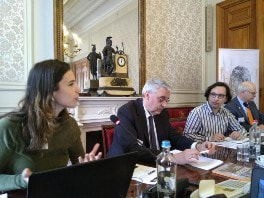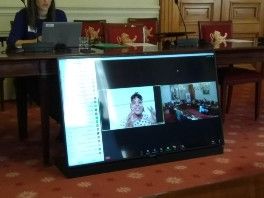 Sarah Hulsmans, Guy Rayée, Fourat Ben Chikha and Ian MacFarlane at the SWOP launch
Sarah Hulsmans, Guy Rayée, Fourat Ben Chikha and Ian MacFarlane at the SWOP launch Lack of information, misinformation, myths about sex and contraception, poor access or even no access to contraception, but also the lack of dialogue about contraception use and pregnancy between partners cause many (young) women to become pregnant unplanned. These challenges mean that one of the most fundamental choices, to become pregnant or not, is not a free and informed choice for many women worldwide. This is the gist of the State of The World Population report by the United Nations Population Fund (UNFPA), 2022.
 Hayathe Ayeva joining the SWOP launch from Togo
Hayathe Ayeva joining the SWOP launch from Togo The report was launched at a blended seminar organised by UNFPA Brussels and the Parliamentarians of the 2030 Agenda. The launch began with a presentation of the report that outlined the challenges related to unplanned pregnancies by Ian McFarlane Director of Communications and Strategic Partnerships at UNFPA.
Sarah Hulsmans, Policy Officer for Reproductive Health at Sensoa took a closer look at the situation in Belgium. Belgium is top of the class when it comes to contraception, but we can certainly do even better. The average age of women having an abortion is 29, so we should think about raising the reimbursement of contraception to the age of 30 to prevent more unwanted pregnancies. More research is also needed on hormonal contraception and its side effects, given the growing concerns about it. We also lack control over the supply and quality of comprehensive sexual education in our schools. This should not be optional.
Hayathe Ayeva, President of the Youth Action Movement of ATBEF (the IPPF member in Togo) explained the situation in Togo. Because of rising social media use there is a lot of misinformation about contraceptives. ATBEF tries to counter this by offering correct information through an app developed for young people. Miss Ayeva also focused on the role of men and boys in preventing unplanned pregnancies and explained they use dedicated blogs and meetings that teach men how to be allies to their partners.
Guy Rayée, Deputy Director of the Directorate General for Development Cooperation and Humanitarian Aid at the Ministry of Foreign Affairs, said that Belgium has made enormous progress in the last 50 years and that this progressive attitude is also reflected in the partnerships with organisations such as UNFPA and in bilateral partnerships with other countries. Belgium also plays a leading role in promoting sexual and reproductive health and rights on the international stage and will host a new She Decides' conference to celebrate the 5th anniversary of the international SRHR movement mid-May in Brussels.
Sarah Hulsmans, Policy Officer for Reproductive Health at Sensoa took a closer look at the situation in Belgium. Belgium is top of the class when it comes to contraception, but we can certainly do even better. The average age of women having an abortion is 29, so we should think about raising the reimbursement of contraception to the age of 30 to prevent more unwanted pregnancies. More research is also needed on hormonal contraception and its side effects, given the growing concerns about it. We also lack control over the supply and quality of comprehensive sexual education in our schools. This should not be optional.
Hayathe Ayeva, President of the Youth Action Movement of ATBEF (the IPPF member in Togo) explained the situation in Togo. Because of rising social media use there is a lot of misinformation about contraceptives. ATBEF tries to counter this by offering correct information through an app developed for young people. Miss Ayeva also focused on the role of men and boys in preventing unplanned pregnancies and explained they use dedicated blogs and meetings that teach men how to be allies to their partners.
Guy Rayée, Deputy Director of the Directorate General for Development Cooperation and Humanitarian Aid at the Ministry of Foreign Affairs, said that Belgium has made enormous progress in the last 50 years and that this progressive attitude is also reflected in the partnerships with organisations such as UNFPA and in bilateral partnerships with other countries. Belgium also plays a leading role in promoting sexual and reproductive health and rights on the international stage and will host a new She Decides' conference to celebrate the 5th anniversary of the international SRHR movement mid-May in Brussels.

 RSS Feed
RSS Feed